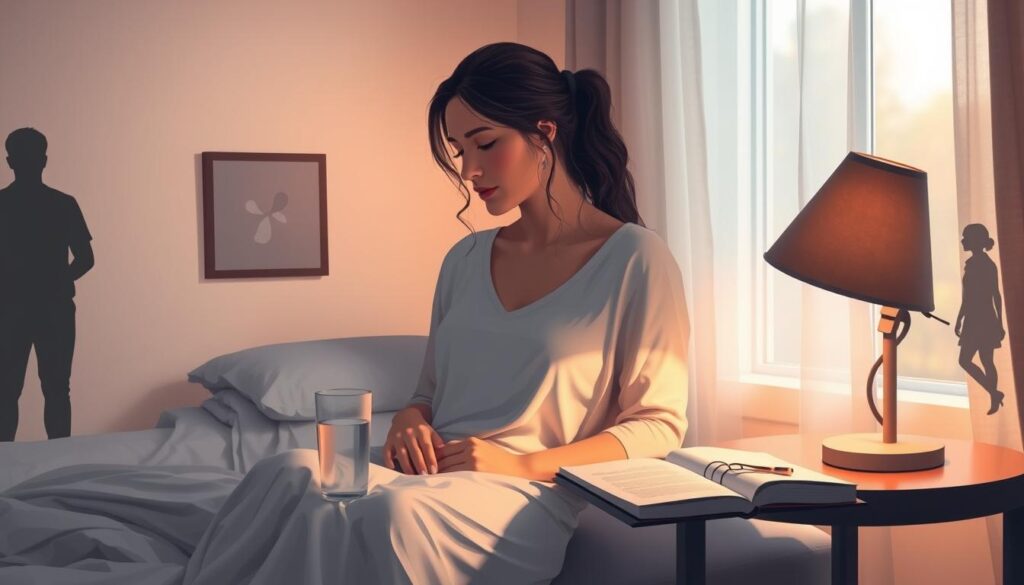Estrogen is vital for your health, affecting many body systems and hormonal balance. Knowing low estrogen signs helps you manage your wellness better. Hormone imbalance can greatly impact daily life for many women1.
Your estrogen levels change throughout life. They peak in your 20s and slowly decrease. By age 50, levels drop by half1. This shift can cause various symptoms that need attention.
Low estrogen signs can arise from many causes. These include too much exercise, thyroid issues, and autoimmune conditions1. Spotting these changes early allows for better management and treatment options.
Key Takeaways
- Estrogen levels naturally decline with age
- Multiple factors can contribute to low estrogen
- Early recognition of symptoms is crucial
- Hormonal changes impact overall health significantly
- Personalized medical guidance is essential
Understanding Estrogen’s Role in Your Body
Estrogen is a powerful hormone crucial for your overall health. It’s more than just a reproductive hormone. Estrogen impacts multiple body systems and maintains critical hormonal balance.
The Importance of Hormonal Balance
Your body relies on precise hormone regulation to function optimally. Hormone imbalance can affect your physical and emotional health. Estrogen helps regulate several key bodily processes:
- Reproductive health and menstrual cycle
- Bone metabolism and density
- Cardiovascular function
- Cognitive performance
How Estrogen Affects Multiple Body Systems
Estrogen levels rise during puberty, impacting body changes. It regulates the menstrual cycle, maintaining balance for regular periods2.
The hormone supports fertility and ovulation. It also plays a role in bone health and cardiovascular function.
| Body System | Estrogen Impact |
|---|---|
| Reproductive | Regulates menstrual cycle, supports fertility |
| Skeletal | Prevents bone loss, maintains bone density |
| Cardiovascular | Helps regulate cholesterol levels |
Normal Estrogen Functions and Regulation
Estrogen deficiency can lead to significant health challenges. During menopause, estrogen levels decline dramatically. This causes symptoms like irregular periods and hot flashes2.
Menopause typically occurs around age 51. It can also lead to potential bone loss.
“Understanding your body’s hormonal changes is key to maintaining optimal health and well-being.”
The FDA recommends consulting healthcare providers for hormone-related concerns. This is especially important during significant hormonal shifts3.
Proper medical guidance can help you navigate potential treatments. It’s essential for maintaining your overall health.
Low Estrogen Symptoms: Key Signs to Watch For
Spotting low estrogen signs is vital for your health. Women may face symptoms that point to hormone imbalances affecting various body systems. Knowing these signs helps you take action for your well-being4.
Hot flashes and night sweats are main red flags. These sudden heat waves can upset your daily routine and sleep. They often cause major discomfort5.
Women might face:
- Unexpected heat sensations
- Intense sweating during nighttime
- Mood swings that feel unpredictable
- Persistent fatigue
Vaginal dryness is another key symptom. It can greatly affect your life quality6. This issue can lead to:
- Uncomfortable intimate experiences
- Increased risk of urinary tract infections
- Reduced sexual satisfaction
Emotional changes often come with these physical signs. You might feel sudden sadness, irritability, or trouble focusing5. These mood swings can be tough to handle.
“Understanding your body’s signals is the first step towards effective management of hormonal changes.” – Women’s Health Expert
If you have many symptoms, talk to a doctor. They can offer clarity and possible treatments4. Early action can help keep you healthy and happy.
Conclusion
Hormone imbalance affects your overall wellness. Estrogen deficiency can impact your emotional and physical health. If you’re experiencing menopause signs, take steps to address your symptoms78.
Doctors recommend comprehensive testing for hormone-related issues. Blood tests and ovarian scans can provide insights into your hormonal health. Hormone replacement therapy may help restore balance and ease uncomfortable symptoms78.
Your lifestyle affects estrogen levels. Consider adding vitamin D and changing your diet. Regular exercise can also support hormonal balance7.
Everyone’s experience is unique. Work closely with your healthcare provider for personalized care. They can tailor treatments to your specific needs.
FAQ
What are the most common symptoms of low estrogen?
Who is most likely to experience low estrogen?
How does low estrogen impact bone health?
Can low estrogen affect mental health?
What treatments are available for low estrogen?
How can I naturally support my estrogen levels?
When should I see a doctor about low estrogen symptoms?
Can men experience low estrogen?
How is low estrogen diagnosed?
Can lifestyle changes help manage low estrogen symptoms?
Source Links
- Important Facts About Low Estrogen – https://www.verywellhealth.com/low-estrogen-levels-4588661
- Estrogen: Hormone, Function, Levels & Imbalances – https://my.clevelandclinic.org/health/body/22353-estrogen
- Estrogen’s Effects on the Female Body – https://www.hopkinsmedicine.org/health/conditions-and-diseases/estrogens-effects-on-the-female-body
- Low estrogen symptoms | hormone specialists in Madison, AL – https://madisonfamilycare.com/blog/10-signs-of-low-estrogen-in-women/
- Low Estrogen Signs and Symptoms and How to Treat Low Estrogen – https://drbrighten.com/low-estrogen-signs-and-symptoms/
- 6 Signs of Low Estrogen and How Estrogen Replacement Therapy Can Help – BioRestore Health – https://biorestorehealth.com/newtown-connecticut/6-signs-of-low-estrogen-and-how-estrogen-replacement-therapy-can-help/
- Low estrogen: Causes, effects, and treatment options – https://www.medicalnewstoday.com/articles/321064
- Estrogen Deficiency: What Women Need to Know – Thousand Oaks – https://www.herabeautyandwellness.com/blog/estrogen-deficiency-what-women-need-to-know/
